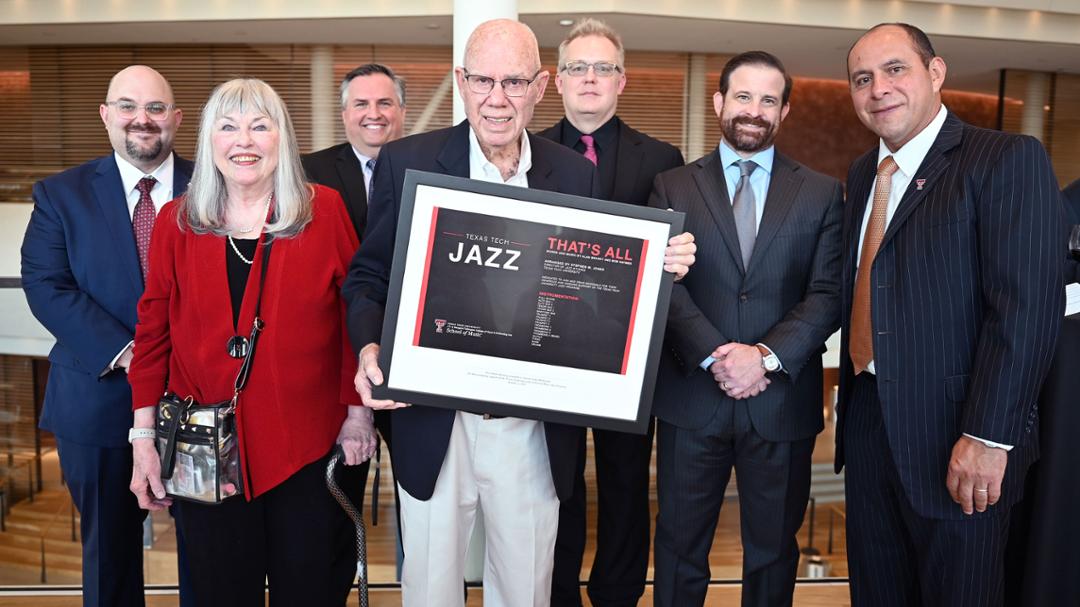The recent gift to the School of Music by the McDonald family will make a lasting impact on the life of Dustin Pedigo and other jazz students.
Dustin Pedigo played the electric bass growing up.
He learned solos from 1970s classic rock, especially Led Zeppelin. There wasn’t a whole lot to do in his hometown of Seminole, Texas. The West Texas town boasts football, oil, church and not much else.

On a family trip to Arkansas in the seventh grade, Dustin discovered a sound he’d never heard before. His father was visiting an old friend who was the son of Jim Dandy, lead singer of Black Oak Arkansas. Naturally, Dustin was enthralled by his father’s eccentric friend, Junior Mangrum.
Also a bass player, Mangrum sat young Dustin down in the living room and asked if he’d ever heard Jaco Pastorius. The middle schooler admitted he had never heard of the jazz bassist, nor jazz itself.
“What?” Mangrum responded. “Not even Charlie Parker? Charles Mingus?”
Mangrum put a CD of Pastorius’ in his stereo and cranked it all the way up. The multi-module amps projected the sounds of jazz fusion, bass and bongos calling and responding to one another.
It was like hearing a new language, one Dustin desperately wanted to speak.
He returned home with one goal: to become a great jazz bassist. He asked his school band director for private lessons and jazz sheet music. He absorbed the knowledge like he absorbed the sounds, frequently and with complete abandon.
By the time Dustin graduated from high school he was excelling at bass and even dabbled in some other jazz instruments. He enrolled at South Plains College in hopes of learning from their commercial music program, which he did, but it was not quite the right fit for him.
He transferred to Texas Tech University’s School of Music housed in the J.T. & Margaret Talkington College of Visual & Performing Arts in 2010. He earned his bachelor’s degree in music with a minor in business, hoping for his performance career to take off after graduation.
Around this same time, Dustin met his girlfriend Ashley, whom he would later marry. They were both musicians and began to play jazz combos together, Dustin on bass and Ashley on keys. They married during Dustin’s time at Texas Tech. They had their first child and as graduation drew near, they found out they were pregnant again.
Ben Haughland, chair of jazz and associate professor of jazz studies, actively tried to recruit Dustin to stay and complete a master’s degree in jazz. There were no jazz degrees for undergraduates, but the School of Music had just announced the launch of a graduate degree in jazz.
“The opportunity sounded great, but there was no way to make it work,” Dustin said. “I had two children to provide for; I needed a job with benefits and health insurance.”
The Jazz Studies Program had limited scholarship funding, but not much.
Every way Dustin looked at it, their family came up short of what they needed. So, he set aside his graduate school aspirations and took a job at Covenant Hospital working nights as the environment services manager.
The sounds of Pastorius and Parker were left behind.
Rooted in Generosity
Craig McDonald met Ann Weaver at Lubbock High School where they graduated together in 1953. They overlapped with Buddy Holly for one year. And while they didn’t mind the growing popularity of this new sound known as rock ‘n’ roll, they were both partial to another genre of music.
“When we started dating, we realized we both loved jazz,” Ann said.
The couple spent time together at record stores, flipping through stacks to discover yet another jazz musician or album they’d not heard before. Billie Holiday, Ella Fitzgerald and Jelly Roll Morton were the soundtrack to Craig and Ann’s early years together.
College and early careers separated them, but Craig and Ann found their way back to Lubbock, and to each other. The couple married in 1960 and played an active role in the community.

Photo Courtesy: Lubbock Avalance-Journal
Still enthralled with the sounds of jazz, Craig and Ann wanted to learn more about the history behind their favorite genre. Their exploration took them to East Lubbock where they attended the Caprock Jazz Festival.
The festival introduced Craig and Ann to the Caviel Family. The couples made fast friends and when Alfred and Billie Caviel decided to donate their business’ building for a museum, Craig and Ann helped make it happen.
“When the Caviel Museum of African American History opened in Lubbock, we did everything we could to help it succeed,” Craig recalled.
The McDonalds watched Lubbock change over the decades as it became integrated.
“I still get goosebumps when I think about it,” Ann recalled. “Jazz musicians paved the way for that change. Their music had a huge impact on the community.”
As jazz musicians began playing all around the city, Craig and Ann spent their evenings at Stella’s when it was on 50th Street since the restaurant offered live jazz.
The McDonalds met Eric Strong at Stella’s and became good friends.
Strong was not only the founder of the Caprock Jazz Festival and the Caviel Museum of African American History, he also was a driving force for the Lubbock Roots Historical Arts Council. The leader and activist made space for storytelling, music, song and dance.
Craig and Ann saw many connections made throughout Lubbock.
“Stella’s was the place to be,” they agree. “We also got to know Alan Shinn and Brad Leali by just watching shows there.”
Shinn and Leali connected the McDonalds to the jazz ensembles at Texas Tech. They became members of Friends of Music in 2007 and have attended nearly every concert from the Jazz Studies Program since. In turn, the McDonalds connected their friends at Texas Tech with other musicians they knew in the community.
For the investment the couple makes, you’d think they were musicians themselves. Craig wanted to play horn but had a barbarous band director in the sixth grade who hit students on the hands.
“After that I got rid of my horn,” Craig recalled.
The McDonalds though, are an exemplary example of musician-audience relationships. Some people enjoy music by creating it and others appreciate it by listening, many do both. Both parts are incredibly important.
Craig and Ann took their appreciation to a whole new level this semester when they gave a $1 million gift to the Jazz Studies Program at Texas Tech, the largest in program history.
“We both just love jazz music,” Ann said, “and our parents laid a foundation for us to follow an example of investing in what you love. Being able to support jazz music, while also supporting students who want to learn and succeed, was just the perfect combination for us.”
Full Circle
The gift from the McDonalds established the McDonald Family Jazz Support Endowment which provides funds in perpetuity for student scholarships, equipment purchases, travel for student experiences and other needs of the program.
One of those students is Dustin.
“I started the graduate program in Jazz Performance this fall,” he said, smiling.
After 10 years of working in health care and then education, Dustin returned to the university, able to continue studying what he loves.
During the past decade, he gigged around town almost every weekend. Having a career outside of music did not stop him from improving his artistry and craft.
“I’ve been active musically my entire life,” Dustin said. “That wasn’t going to change.”
But in the time since Dustin finished his undergraduate degree, he and his wife welcomed a third child, keeping their focus on finances and stability, which unfortunately, does not always align with a career as a musician.
That all changed when Dustin played a gig with Kevin Whalen last year. Whalen is an associate professor of trumpet and jazz studies.
“Do you like your job?” Whalen asked Dustin, who was teaching elementary school at the time.
“I guess,” Dustin replied.
“Well, if that changes, give me a call.”
Dustin went home and told Ashley about the conversation, wondering about what Whalen left unsaid. Dustin had gotten his teaching certificate five years prior and was teaching third grade.
He didn’t particularly dislike it; it was just never his long-term goal. And according to Dustin, he liked the idea of working with people who wouldn’t wipe their noses on him.
So, he called Whalen up and inquired if things had changed in the graduate program’s funding.
It had.
Prior to the McDonald gift, the program was already in better shape than it had been 10 years prior. But faculty knew with the upcoming gift, they’d be in a situation to bring in students who might otherwise not be able to come.
“The finances of this program are better than they’ve ever been,” Dustin said excitedly. “Getting a teaching assistantship and a full-ride scholarship has been really validating, which I needed after a decade away from academia.”
Dustin splits time between classes, concerts and his family, of course. They’re his biggest fans and attend performances whenever they can. He’s even raising his children on jazz and rock and roll. His fifth grader can identify musicians better than most adults, educating her classmates on the signature sounds of Thelonious Monk and Prince.
All of this is a reality due to the generosity of Craig and Ann.
“This gift is going to draw more talent to Texas Tech,” Dustin said, “both in terms of faculty and students. We already have phenomenal faculty; this gift will help retain them.”
Because of the gift, the School of Music can now offer an undergraduate degree in jazz. This will continue to put the university on the map in big ways.
The excitement has been contagious.
“We’re truly grateful to the McDonald family for their generosity and support over these many years,” said Chair of Jazz and Associate Professor of Jazz Studies Ben Haugland. “A gift of this magnitude is transformative. It furthers the art form and provides generations of musicians the opportunity to pursue jazz.”
Who knows, perhaps Dustin’s fifth grader will find herself a second-generation recipient of the McDonalds’ generosity.

